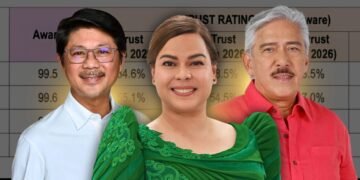In a nation where family names often eclipse policy platforms in the ballot box, Senator Francis “Kiko” Pangilinan has reignited a decades-long battle against political dynasties.
Last week, he filed the Anti-Political Dynasty Act of 2025, a measure that seeks to prohibit relatives from holding or running for multiple elective offices, aiming to breathe life into a constitutional provision that has languished unenforced for nearly 40 years.
The bill, introduced amid fresh data highlighting the dominance of political clans in the recent midterm elections, represents Pangilinan’s latest attempt to dismantle what critics call a feudal system masquerading as democracy.
“Political power and public service must never be treated as a birthright,” Mr. Pangilinan said in a statement. “Leadership should be earned, not inherited.”
Political dynasties — families that control multiple seats across local and national government — are a hallmark of Philippine politics, rooted in colonial-era patronage and exacerbated by weak institutions.
The 1987 Constitution, drafted in the aftermath of the Marcos dictatorship, explicitly calls for the prohibition of such dynasties to ensure “equal access to opportunities for public service.” Yet, no enabling law has ever been passed, leaving the provision as little more than aspirational rhetoric.
Mr. Pangilinan, a 61-year-old lawyer and farmer who has served in the Senate off and on since 2001, has been a vocal advocate for reform.
A member of the opposition Liberal Party, he previously filed similar bills in the 17th, 18th, and 19th Congresses, only to see them stall in committees dominated by dynastic lawmakers.
His persistence underscores a broader frustration among reformists: In a country where poverty and inequality persist, dynasties are blamed for perpetuating corruption, nepotism, and policy inertia.
The latest iteration of the bill, filed on July 9 and formally announced on July 18, defines a political dynasty as the concentration of elective positions among relatives within the second degree of consanguinity or affinity — including parents, children, siblings, grandparents, and in-laws.
It would bar family members from running simultaneously or successively for offices at any level, from barangay captains to the presidency, even if no relative is currently in power, if the candidacy would result in dynastic control.
Enforcement would fall to the Commission on Elections, which could cancel candidacies on its own initiative or upon public petition.
Voters could also file quo warranto actions to disqualify elected officials. Penalties include disqualification from office and potential criminal charges, aiming to empower citizens in a system often seen as rigged.
In a video posted on July 16, Mr. Pangilinan elaborated: “The leadership is not an inheritance. It should be earned through trust, not passed within one clan.”
The post, which went viral on social media, featured a breakdown of the bill’s key provisions, showing growing online support for reform.
Recent elections have amplified the urgency.
Data from the Philippine Center for Investigative Journalism show that in the May 2025 midterms, 87 percent of governors, 80 percent of congressional district representatives, and 53 percent of mayors hail from dynasties.
Eighteen “obese dynasties” — families with five or more members elected — emerged victorious, while over 800 posts went uncontested. Experts link this dominance to the country’s 10 poorest provinces, where dynasties control resources and stifle opposition.
At least two other senators, including members of the majority bloc, have filed companion bills in the incoming 20th Congress, signaling potential cross-aisle support.
In his official Senate statement, Pangilinan called the measure a necessary correction to decades of political gatekeeping.
President Ferdinand Marcos Jr., himself from a prominent dynasty, expressed openness to the measure on July 18, with his office stating he would review it if it advances.
Still, critics doubt whether Congress — 70% of whom belong to dynasties — will ever pass it.
Short term limits — three years for local officials — inadvertently encourage families to rotate positions, creating “fat dynasties” that evade accountability.
“The odds may seem slim,” said Julio Teehankee, a professor at De La Salle University, in a recent analysis, “but public pressure could tip the scales.”
In another press release issued July 18, Pangilinan emphasized: “This is not just a legal fight — it’s a democratic one.”
As the 20th Congress convenes next week, the bill’s fate will test whether the Philippines can finally confront its dynastic legacy — or once again choose family over reform.












